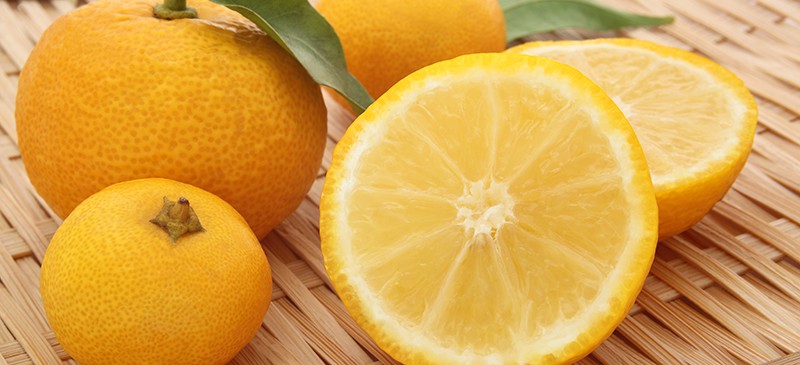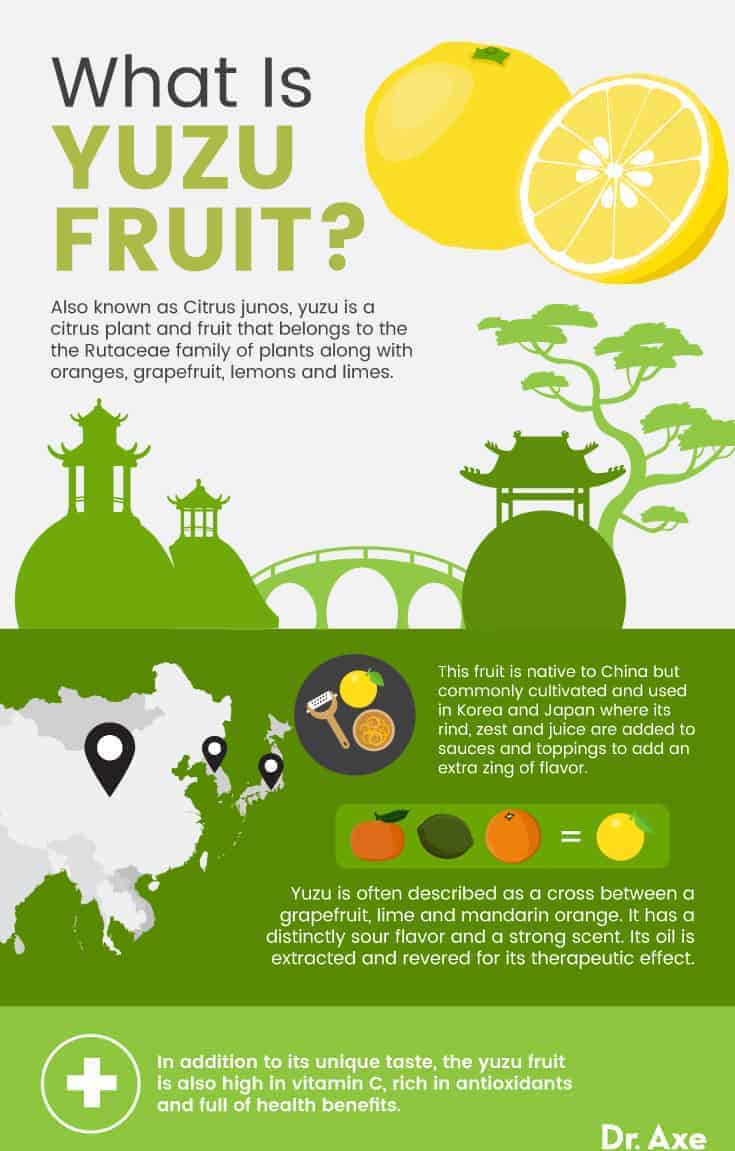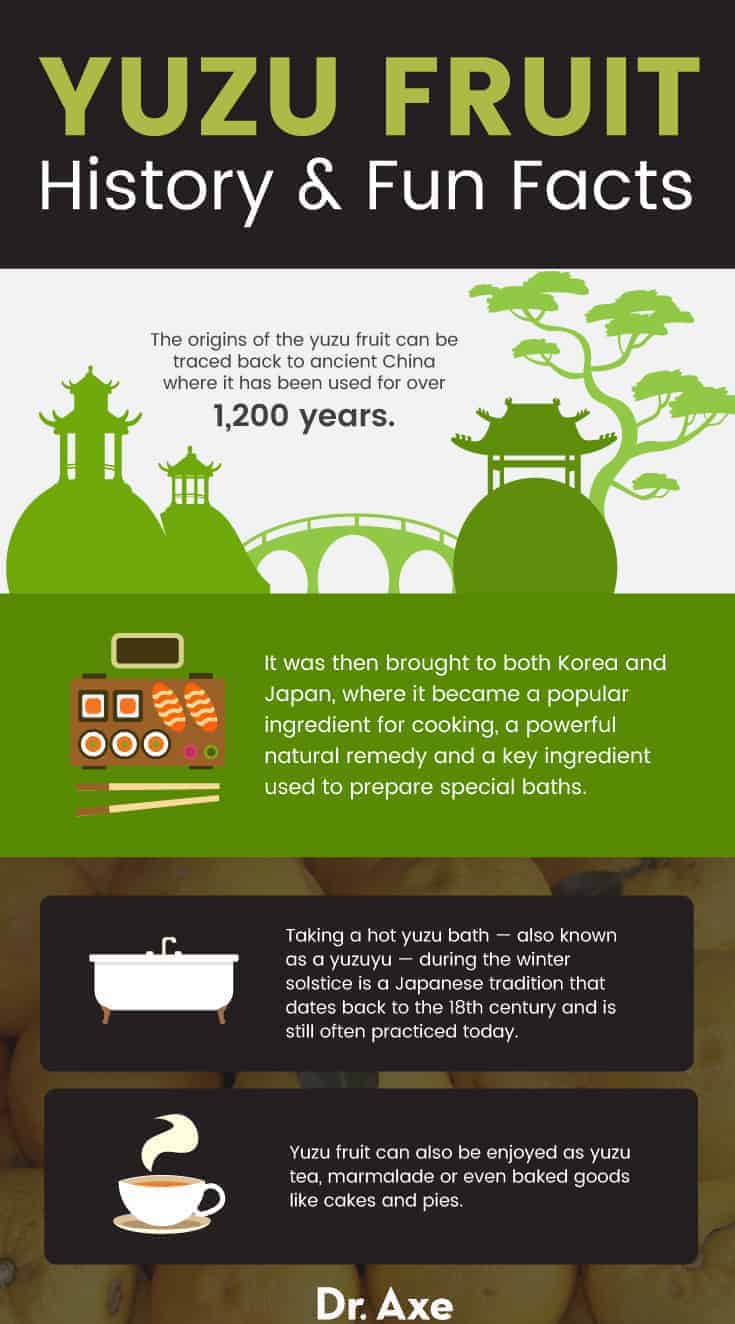Have you heard of yuzu fruit? If you’re like most people, there’s a good chance you haven’t.
Although this flavorful citrus fruit may be unknown to many, it has been an integral part of Asian cuisine and culture for centuries.
What is yuzu? With its unique citrus flavor and strong fragrance, the juice, rind and peel of this fruit have recently started making their way into kitchens and restaurants around the world, and the fruit makes an excellent addition to sauces, seafood dishes and desserts.
The oil of this fruit has also been traditionally used as an essential oil to help keep skin smooth, increase circulation and boost immunity.
Yuzu fruit also contains many beneficial compounds that have been shown to help reduce inflammation, stop blood clotting and promote better health.
Yuzu Fruit Nutrition Facts
Also known as Citrus junos, yuzu is a citrus plant and fruit that belongs to the the Rutaceae family of plants along with oranges, grapefruit, lemons and limes.
This small tree or shrub has long thorns, grows up to about six feet tall and is able to withstand cold climates. It produces fruit the size of a tangerine with rough, uneven skin that can be yellow or green depending on the degree of ripeness.
Yuzu is often described as a cross between a grapefruit, lime and mandarin orange. It has a distinctly sour flavor and a strong scent. Its oil is extracted and revered for its therapeutic effect.
This fruit is native to China but commonly cultivated and used in Korea and Japan, where its rind, zest and juice are added to sauces and toppings to add an extra zing of flavor. In recent years, it has become increasingly available in juice, freeze-dried or powdered form around the world in both specialty stores and online retailers.
In addition to its unique taste, the yuzu fruit is also high in vitamin C, rich in antioxidants and full of health benefits.
A 100-gram serving of yuzu juice provides approximately:
- Calories: 67
- Total Carbohydrates: 20 g
- Vitamin C: 100 mg (111% DV*)
- Iron: 1.2 mg (7% DV)
*Daily Value: Percentages are based on a diet of 2,000 calories a day.
Yuzu fruit nutrition also contains some protein, fiber and fat in varying degrees, along with vitamin A, thiamine, vitamin B6, vitamin B5, copper, magnesium, zinc, calcium, riboflavin, niacin and vitamin E, according to research.
Health Benefits
1. May Enhance Mood
Yuzu is well-known for its therapeutic citrus fragrance, which has been shown to have mood-boosting and stress-reducing properties.
A 2017 study measured the effects of the yuzu scent on 17 women with premenstrual symptoms. Yuzu was found to improve the mood of participants, decreasing levels of anger, anxiety and fatigue.
Other studies have found that the inhalation of the yuzu scent for as little as 10 minutes decreased mood disturbances and reduced emotional stress.
2. Helps Relieve Inflammation
Inflammation is a normal immune response that occurs in the body as a result of injury or damage to tissues. Chronic inflammation, on the other hand, can be dangerous and may contribute to the development of disease. (4)
Yuzu fruit is high in antioxidants, which are compounds that help neutralize the harmful free radicals, which can cause inflammation and chronic disease.
A test-tube study in the Journal of Food Science showed that limonene, a compound that is concentrated in the yuzu peel, helped reduce inflammation and prevented the formation of free radicals. (5)
Other parts of the yuzu fruit may also contain powerful antioxidants. In fact, a study conducted in 2014 showed that yuzu seed oil contained twice the potent antioxidant activity of antioxidant-rich grapefruit seed oil. (6)
In addition to yuzu, other anti-inflammatory foods include green leafy vegetables, berries, ginger and turmeric.
3. Can Inhibit Blood Clotting
Blood clotting is an important process that helps to prevent excess bleeding. However, some people may have an increased risk of forming harmful blood clots that can block blood flow and cause problems like heart attack, stroke or pulmonary embolism.
Some research has shown that yuzu fruit could prevent the formation of blood clots and act as an anticoagulant, similar to blood-thinning medications.
A 2015 study, for example, showed that yuzu extract was able to inhibit platelet aggregation in human cells. Platelets are a component of blood cells, and platelet aggregation, or clumping, can lead to blood clots.
Another study in Korea confirmed these findings and noted that these beneficial anti-clotting properties were likely due to the presence of hesperidin and naringin, two powerful components found in yuzu.
READ RELATED: Justin Jones cries racism over expulsion but defended *his* racism against Indian-American GOP rep
Of course, if you are already taking blood thinners or anticoagulants, you should consult with your doctor before eating yuzu fruit as it can enhance the effects of these medications and could produce harmful side effects.
4. Boosts Immune Health
Yuzu is high in both vitamin C and antioxidants, both of which can help kick up your immune health and keep you healthy.
A review in the Annals of Nutrition & Metabolism reported that vitamin C may be able to help reduce duration and severity of respiratory tract infections. It could also prevent pneumonia, malaria and diarrhea as well as improve the outcomes for these conditions.
Antioxidants can also keep your immune system strong. They prevent damage to your immune cells by neutralizing free radicals and protect against infections caused by bacteria or viruses.
5. Helps Reduce Chronic Disease Risk
Thanks to the anti-inflammatory effects of yuzu, it may also help reduce the risk of chronic disease. This is because inflammation is linked to the development of many chronic diseases.
Cancer and coronary heart disease, for instance, have been associated with chronic inflammation in several studies.
Inflammation has also been tied to some pulmonary diseases, diabetes, inflammatory bowel disease and certain neurological conditions.
Pairing plenty of high-antioxidant foods like yuzu fruit with a healthy lifestyle can cut down on your risk of chronic disease and also lead to better health.
6. Protects Brain Health
Yuzu fruit contains certain beneficial compounds that have been shown to potentially prevent cognitive decline and optimize the health of your brain.
In a study published in the Journal of Nutrition, treating rats with yuzu extract was found to prevent cognitive dysfunction by reducing the buildup of beta amyloid proteins in the brain. The accumulation of beta amyloid proteins is believed to contribute to the development of cognitive disorders such as Alzheimer’s disease.
Additionally, the antioxidants found in yuzu could help prevent free radical damage to keep your brain healthy and prevent other neurodegenerative conditions, such as Parkinson’s disease.
History
The origins of the yuzu fruit can be traced back to ancient China, where it has been used for over 1,200 years. It was then brought to both Korea and Japan, where it became a popular ingredient for cooking, a powerful natural remedy and a key ingredient used to prepare special baths.
In Japan, in particular, yuzu was traditionally used for hot yuzu baths, which were believed to fight off colds, increase circulation and smooth the skin. Whole yuzu fruits or fruits enclosed in bags are dispersed throughout the hot water, which helps release their soothing scent and medicinal properties.
Taking a hot yuzu bath — also known as a yuzuyu — during the winter solstice is a Japanese tradition that dates back to the 18th century and is still often practiced today. In fact, yuzu hot spring baths are still available around Japan today.
While the use of yuzu was at one time mostly limited to areas like Japan, Korea and China, it has gained popularity in recent years and is now found around the world.
How to Use
Because the yuzu fruit is highly acidic, it is rarely eaten whole. However, the juice, rind and zest are commonly used as a garnish or seasoning.
The oil is also extracted to create an essential oil that can be diffused, added to a warm bath or mixed with lotion and applied to the skin.
Yuzu fruit can be enjoyed as yuzu tea, marmalade or even baked goods, like cakes and pies. The rind is sometimes also added to noodle dishes, seafood recipes and sauces to add a punch of flavor.
It can be challenging to find whole yuzu fruit in stores, but it is sometimes available in select specialty Japanese stores. It can also be found freeze-dried or as a vinegar, paste, juice or powder at specialty stores and online.
Looking for some interesting ways to cook and use yuzu? Here are some yuzu recipes to try:
Risks and Side Effects
Although rare, some people may be allergic to yuzu. If you have a citrus allergy, you should not consume yuzu fruit. Symptoms of an allergic reaction can include tingling and itching of the lips, tongue and throat, as well as redness and swelling.
Some people may also be allergic to citrus fruit peels. Coming into contact with the peel of the fruit can result in symptoms of contact dermatitis like burning, itching or dry, flaky skin. If you experience these, or any other adverse side effects caused by yuzu, discontinue use immediately, and talk to your doctor.
Because yuzu can have an anticoagulant effect, it may interact with blood thinners, such as Warfarin and Coumadin. If you’re taking these medications, you may want to consider avoiding yuzu.
For most people, though, yuzu can be safe and effective for adding flavor to foods, enhancing mood and boosting health.
Conclusion
- Yuzu fruit is a citrus fruit that is native to China but widely popular in both Japan and Korea.
- Although the fruit is not usually eaten whole, the rind, peel and zest are common additions to sauces, dressings and desserts. The oil is also mixed with lotions, diffused or used to prepare hot baths.
- Look for yuzu in oil, juice or powder form, and give it a try to take advantage of its unique flavor, soothing scent and multitude of health benefits.
- Yuzu fruit benefits include potentially helping elevate mood, inhibit blood clot formation, boost immune health, improve brain health, reduce inflammation and prevent chronic disease.
!function(f,b,e,v,n,t,s)
{if(f.fbq)return;n=f.fbq=function(){n.callMethod?
n.callMethod.apply(n,arguments):n.queue.push(arguments)};
if(!f._fbq)f._fbq=n;n.push=n;n.loaded=!0;n.version=’2.0′;
n.queue=[];t=b.createElement(e);t.async=!0;
t.src=v;s=b.getElementsByTagName(e)[0];
s.parentNode.insertBefore(t,s)}(window, document,’script’,
‘
fbq(‘init’, ‘3475171552810057’);
fbq(‘track’, ‘PageView’);







